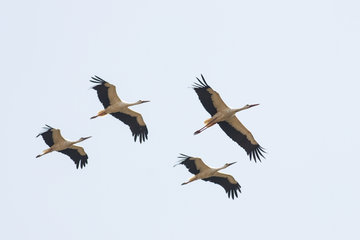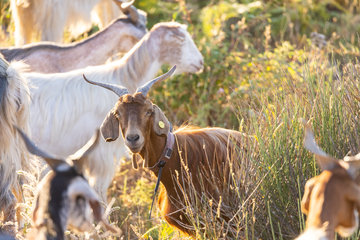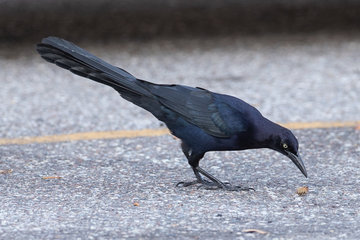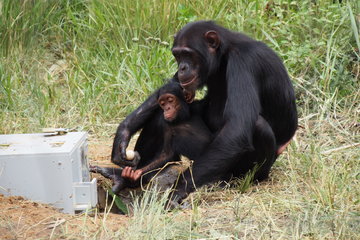Does parenting hamper the sex life of male black coucals?
Although the raising of the young is a matter for men in these birds, parenthood is less expensive for the fathers than thought
In the black coucal sex-roles are reversed: females aggressively defend their territories and males rear the young. Despite the large effort for parental care, males still find opportunities to sire young in nests of other males, as a team of scientists led by the Max Planck Institute for Ornithology in Seewiesen discovered. Even though fathers only succeed half as often as males who are “free” and do not have to tend a brood, caring for young appears to be less costly than previously thought.

In contrast to our common cuckoo, African black coucal are not brood-parasites. Instead, they raise their young on their own. The females of this species are much larger than the males. They sing and defend large territories in which they “pair” with up to five males simultaneously. The smaller males, on the other hand, hardly sing, but hatch the eggs and raise the young without help from the female. This is remarkable, as the rearing of nestlings is considered to be particularly energy- and time-consuming and males cannot rely on being the true fathers of the young they care for. On average, at least one “foreign cuckoo child” not sired by the feeding male, can be found in every other nest. It may not be surprising that the black coucal is the only known bird species with altricial young and sole male care.
Scientists of the Max Planck Institute for Ornithology in Seewiesen, the University of Dodoma in Tanzania, and the University of Zurich wanted to find out how much male-only care prevented males from siring young in foreign nests. They discovered that the males still had their opportunities to produce additional offspring during the approximately six-week period of intensive brood care, this only happened less often. During the egg brooding period, their chances of foreign paternity fell by 17 percent, compared to the “carefree period”. During the most intense period when they had to feed nestlings their chances dropped by 48 percent, and in the period of caring for fledglings by 26 percent.
“We were also able to show that with increasing distance to one's own nest, the probability of siring young in other males’ nests decreased drastically; beyond 400 meters outside one's own territory, the probability is close to zero"; says Wolfgang Goymann, head of the study. Therefore, due to the rearing of young, male black coucals experience a somewhat restricted sex life, but they never face a complete drop-out of the mating pool.
Females with constantly high reproduction rate

Female black coucals, on the other hand, have a consistently high reproductive potential during the entire breeding season, which lasts up to four months. Grasshoppers, praying mantises and frogs - the main source of food for black coucals - are available in large abundance during the breeding season. Hence, the reproductive-rate of females is limited by the number of males whom they can provision with eggs rather than her own potential to lay eggs. Food abundance is certainly also a reason that one parent alone can provision the young within a relatively small territory.
The male, for whom a female is preparing a nest, guards his partner to secure his genetic paternity, but once the second egg has been laid he needs to start incubation and thus can no longer follow the female. Accordingly, paternity analyses have shown that it is often the later laid eggs that are sired by other males.
“Male-only care does not seem to hamper sex life of male black coucals as much as previously assumed. Even when they feed young they can still take opportunities to sire young in other males’ nests. Thus, the costs of parenting in terms of lost mating opportunities are only moderate, and this has certainly favoured the evolution of male-only care in this species", concludes Goymann.













